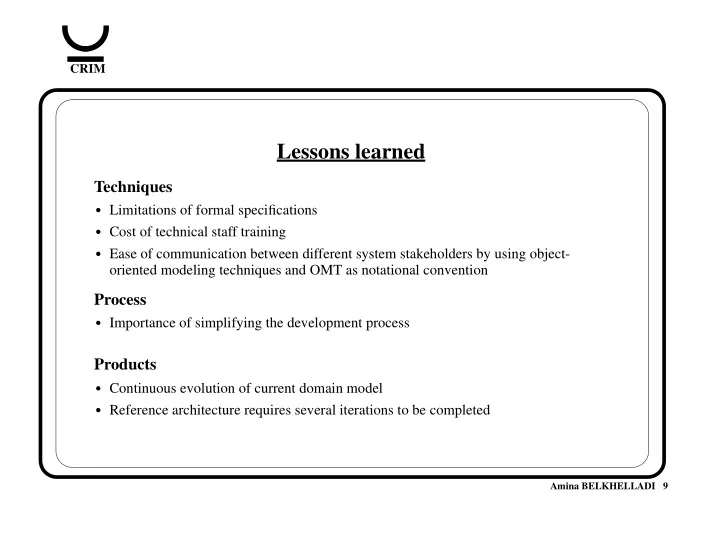

CRIM Lessons learned Techniques • Limitations of formal specifications • Cost of technical staff training • Ease of communication between different system stakeholders by using object- oriented modeling techniques and OMT as notational convention Process • Importance of simplifying the development process Products • Continuous evolution of current domain model • Reference architecture requires several iterations to be completed Amina BELKHELLADI 9
CRIM • Experience (3) Data Conversion Manager Keyboard Presentation Code Page Comm. Emulation I/O Data Data Manager Translator Manager Manager OIA Data 3270 Data Emulation Trigger Data Emulation Subsystem Detector Amina BELKHELLADI 8
CRIM • Experience(2) Real Systems Emulator x Emulator 5250 Object-oriented Emulation Emulator 3270 Emulator 3270 Systems Legacy Systems OOCA Conceptual Architecture Execution Architecture OOEA Modular Partial Architecture OOMPA System Models OOCA (Object-oriented Conceptual Architecture) OOEA (Object-oriented Execution Architecture) OOMPA (Object-oriented Modular Partial Architecture) Amina BELKHELLADI 7
CRIM • Experience(1) SNA PC Eicon (Unix 3270 access) SDLC link E TCP/IP Telnet for Eicon Cards X.25 Host TCP/IP workstations SNA asynchronous terminals Amina BELKHELLADI 6
CRIM Process Overview Requirements Analysis Problem Understanding Object-oriented Domain Modelling Modelling Domain Engineering and Building Blocks Construction Implementation Amina BELKHELLADI 5
CRIM MODL Techniques • Object-oriented methods • Formal specification techniques and languages • Combination of both Process • Development steps overview Products • Domain engineering • Reference architecture Amina BELKHELLADI 4
CRIM The Usefulness of Software Architecture A software architecture (SWA) identifies a collection of functional modules shared by a family of products , and the relations between such modules. A SWA can me described using different views for capturing distinct properties of a software system. Our approach is based on two principal views: • Static • Dynamic Amina BELKHELLADI 3
CRIM Why formal architectures? Legacy software systems reengineering problems: • Inability to recover design. • Inability to understand well large and complex systems. • Inability to modify, extend implemented software systems. • Increased cost of software development . • Lack of high quality systems. Amina BELKHELLADI 2
CRIM Formalizing Software Architectures: An Industrial Experience Petre Dini, Amina Belkhelladi and Walcelio L. Melo (CRIM) Amina BELKHELLADI 1
Recommend
More recommend